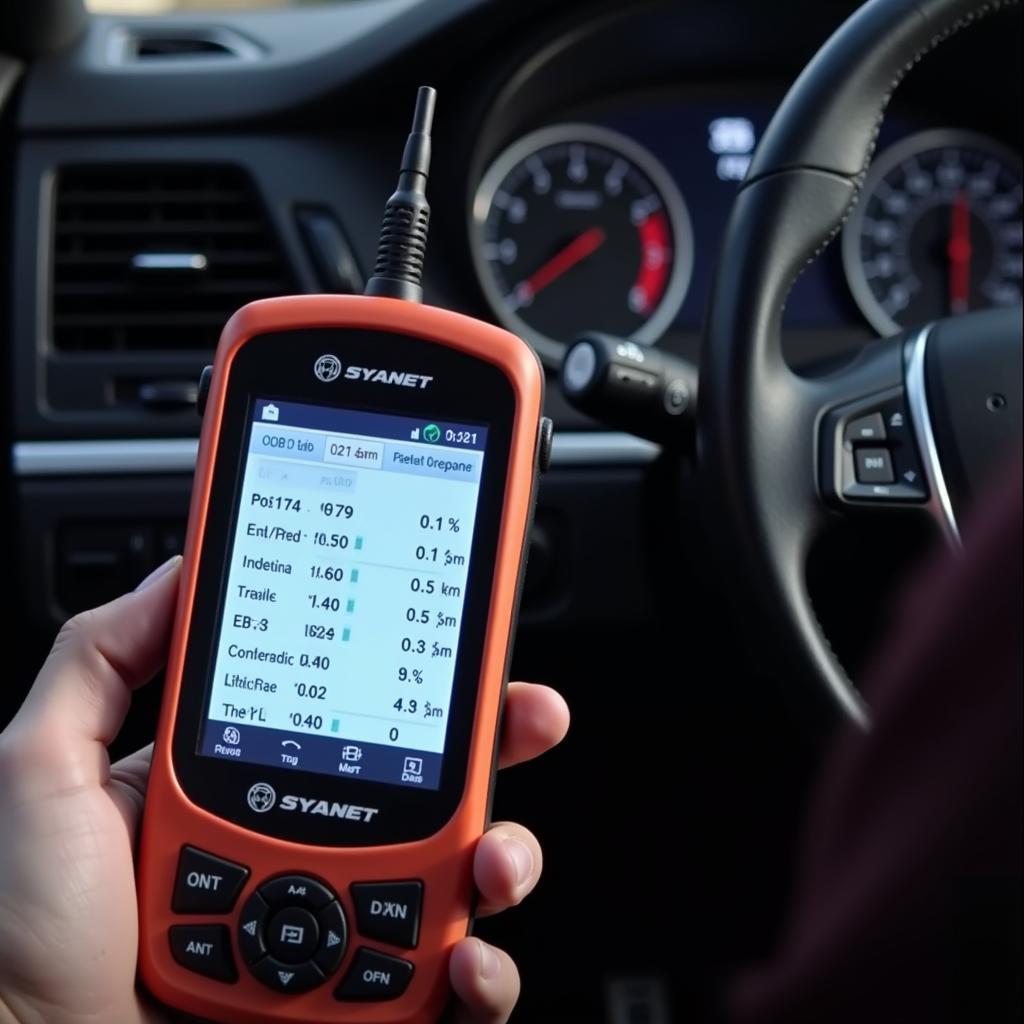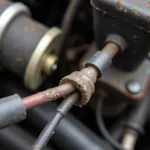An OBD2 scanner reading of P0174 indicates a problem with your car’s engine, specifically a “System Too Lean (Bank 1)”. While it may sound intimidating, understanding this common code can save you time, money, and potential engine damage. This comprehensive guide will delve into the intricacies of the P0174 code, empowering you to diagnose and potentially fix the issue.
What Does the P0174 Code Mean?
The P0174 code signals that the air-fuel mixture in your engine’s combustion chamber is too lean. This means there’s too much air compared to the fuel, which can lead to poor engine performance and potential damage. The “Bank 1” refers to the side of the engine containing cylinder #1.
Common Causes of the P0174 Code
Several factors can trigger a P0174 code, and pinpointing the exact culprit requires a systematic approach:
-
Vacuum Leaks: One of the most common causes, vacuum leaks disrupt the precisely balanced air-fuel ratio. These leaks can occur in various components, including intake manifold gaskets, vacuum hoses, and the PCV valve.
-
Oxygen Sensor Malfunction: The oxygen sensor plays a critical role in monitoring the air-fuel mixture and sending data to the engine control unit (ECU). A faulty sensor can send inaccurate readings, leading to an improper mixture.
-
Fuel Injector Problems: If a fuel injector is clogged or malfunctioning, it can restrict fuel flow, causing a lean condition.
-
Fuel Pressure Issues: Low fuel pressure, often caused by a failing fuel pump or a clogged fuel filter, can also contribute to a P0174 code.
-
Mass Air Flow (MAF) Sensor Failure: The MAF sensor measures the amount of air entering the engine. If it fails or gets dirty, it can disrupt the air-fuel mixture.
Recognizing the Symptoms of a P0174 Code
Identifying the symptoms associated with a P0174 code is crucial for early detection and prevention of further damage. Keep an eye out for:
-
Check Engine Light: The most obvious indicator, the check engine light will illuminate on your dashboard when the ECU detects a problem.
-
Rough Engine Idle: A lean air-fuel mixture can cause the engine to idle erratically or roughly.
-
Engine Misfires: The engine may misfire, especially during acceleration, due to the improper combustion caused by the lean mixture.
-
Reduced Engine Power: You might experience a noticeable decrease in engine power and acceleration.
-
Increased Fuel Consumption: Ironically, a lean mixture can sometimes lead to increased fuel consumption as the ECU tries to compensate for the lack of fuel.
Diagnosing the P0174 Code with an OBD2 Scanner
An OBD2 scanner is an invaluable tool for diagnosing the underlying cause of the P0174 code. Here’s how to use it effectively:
-
Read the Code: Connect the OBD2 scanner to your vehicle’s OBD2 port and retrieve the stored codes. Note any other codes present, as they might be related.
-
Clear the Code: After noting the codes, clear them using the scanner. This will reset the check engine light temporarily.
-
Test Drive: Take your vehicle for a test drive, replicating the conditions under which the code initially appeared.
-
Re-scan for Codes: After the test drive, connect the scanner again and check if the P0174 code has returned. If it has, proceed with further diagnosis.
Fixing the P0174 Code: Step-by-Step Guide
Once you’ve diagnosed the cause of the P0174 code using your OBD2 scanner and potentially other diagnostic tools, you can begin the repair process. Here’s a general guide to address common causes:
1. Repairing Vacuum Leaks:
-
Visually inspect all vacuum hoses, intake manifold gaskets, and the PCV valve for cracks, loose connections, or damage.
-
Use a carburetor cleaner sprayed around potential leak points while the engine is idling. A change in engine RPM indicates a leak.
-
Replace any damaged or leaking components.
2. Replacing a Faulty Oxygen Sensor:
-
Locate the oxygen sensor upstream of the catalytic converter on Bank 1.
-
Disconnect the sensor and install a new one, ensuring proper torque specifications.
3. Addressing Fuel Injector Issues:
-
Run a fuel injector cleaner through the fuel system to remove deposits and debris.
-
Check the fuel injector’s resistance using a multimeter. Out-of-range readings indicate a faulty injector.
-
Replace clogged or malfunctioning injectors.
4. Resolving Fuel Pressure Problems:
-
Check the fuel pressure using a fuel pressure gauge. Low pressure suggests a problem with the fuel pump or filter.
-
Replace the fuel filter if it’s clogged.
-
Replace the fuel pump if it’s failing to provide adequate pressure.
5. Cleaning or Replacing the MAF Sensor:
-
Locate the MAF sensor in the air intake duct between the air filter and the throttle body.
-
Carefully remove the sensor and clean it with MAF sensor cleaner.
-
Reinstall the sensor and ensure all connections are secure.
Preventing Future P0174 Codes
Preventing future occurrences of the P0174 code involves regular maintenance and a watchful eye:
-
Regularly inspect vacuum hoses and connections.
-
Replace air and fuel filters according to the manufacturer’s recommended intervals.
-
Use high-quality fuel and fuel additives to prevent deposit buildup in the fuel system.
-
Address any engine issues promptly to avoid cascading problems.
Conclusion
The P0174 code, while potentially concerning, doesn’t have to spell disaster for your vehicle. Armed with the knowledge of its causes, symptoms, and solutions presented in this guide, you can take proactive steps to diagnose and address the issue. Remember, an OBD2 scanner is your greatest ally in understanding your vehicle’s health. Regularly scanning your vehicle and addressing issues promptly can save you money and headaches in the long run.
If you need further assistance diagnosing your vehicle’s specific issue or need help selecting the right OBD2 scanner for your needs, feel free to contact us via WhatsApp at +1(641)206-8880 or email us at [email protected]. Our team of automotive experts is available 24/7 to provide you with the support you need.


